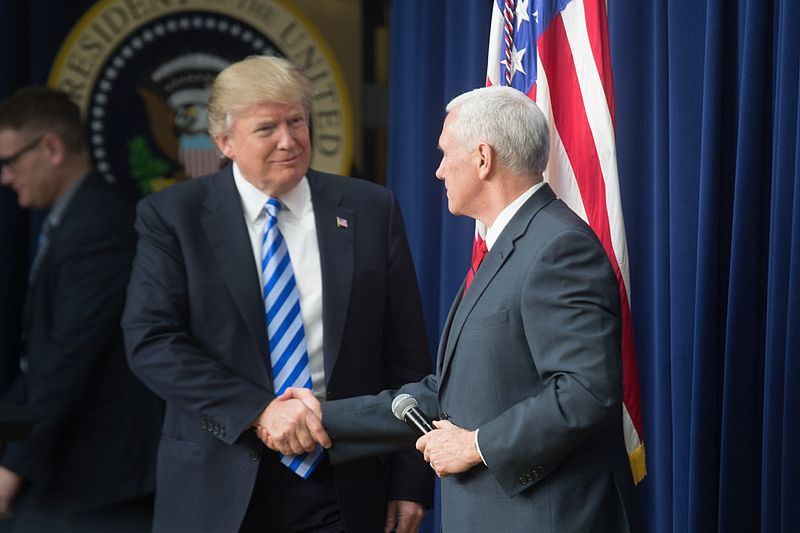
During the presidential campaign and in the immediate aftermath of his election victory, Donald Trump had made a number of conciliatory remarks about Russia’s president Vladimir Putin and the possibility of substantial improvement in relations between Washington and Moscow. On the campaign trail he also made the well-publicized statement that NATO was obsolete, and last July he declared that “Crimea is none of our business.” He had also promised to end regime-change operations, advised Obama to stay out of Syria, and indicated that President Bashar al-Assad staying in power was not to be discounted.
In his first ten weeks in the White House President Trump has made U-turns on all key fronts. In the course of a single day—Wednesday, April 12—he made no fewer than four public statements which repudiate his previous positions. Standing next to NATO Secretary General Jens Stoltenberg at an East Room news conference, Trump declared that NATO was “no longer obsolete.” Only days after unleashing cruise missiles against Syrian government forces he described Bashar al-Assad as a “butcher” over alleged chemical weapons attacks on civilians, sounding like an avid advocate of regime change. In an interview that aired also on Wednesday, Trump said that Putin was partly to blame for the conflict in Syria and denounced the Russian president for backing Bashar. At a White House press conference later in the day he said that “right now we are not getting along with Russia at all; we may be at an all-time low in terms of relationship with Russia.” Asked whether Syrian forces could have launched the chemical attack without Russia’s knowledge, Trump replied that it was possible but unlikely.
When asked by CNN’s Jim Acosta about apparent reversals, White House press secretary Sean Spicer replied, “Circumstances change.” Trump’s embrace of establishmentarian positions was confirmed in an interview with the New York Post last Tuesday in which he openly criticized his political chief strategist Steve Bannon, whose political future now seems uncertain. Bannon was excluded from the National Security Council last week, in a move that was widely interpreted as a victory for supporters of the bipartisan imperial consensus.
Trump has succumbed to the globalist-interventionist pressure, which is regrettable but not surprising. His statements on disengagement from the global empire project, détente with Russia and restraint in foreign relations—cogent and forcefully presented during the campaign—were written by anti-establishmentarians like Bannon and Stephen Miller who are now on the way out. The grand-strategic assumptions behind such missives had never been fully internalized by the President himself. Trump’s absence of deeply-held convictions on world affairs enabled the Deep Staters to impose their agenda: open-ended Full Spectrum Dominance, Russia-as-enemy for ever, and NATO for ever.
This is an act of betrayal. Donald Trump ran, and won, on a platform summarized by the slogan America First. It was not a triumphal slogan of exceptionalist grandomania shared by the Duopoly, but a call for the return to diplomatic realism. As our old friend Ron Maxwell noted on breitbart.com, “Donald Trump campaigned on a promise of no more wars of choice: no military interventions to liberate other countries, to intervene in so-called ‘humanitarian’ crusades, to force regime change, to coercively spread democracy, or to take sides in other people’s wars or civil wars.” Tragically, President Trump appears to have succumbed to the Beltway’s permanent war party.
The Munich Security Conference last February 17 was an early turning point. Vice-President Mike Pence and Secretary of State Rex Tillerson praised the virtues of NATO and the European Union. They were acting as “adults” to their European hosts’ delight, and in open disregard of Trump’s previously stated skepticism vis-à-vis both institutions. It is an even bet that in return for his volte-face Trump will be allowed to erect the wall along the southern border and expel illegals who commit crimes, to start rebuilding the crumbling domestic infrastructure, or to haggle with the Chinese on trade . . . but on all key foreign issues the American shadow government—specifically its key components in the national security apparat and the military-industrial complex—have prevailed. Its ideological and deterritorialized understanding of the American interest will continue to be translated into high-risk policies which have yielded disastrous results in Iraq and Libya.
Right now the most dangerous potential flashpoint is Syria. If Trump imposes a no-fly zone in any part of that country, or proclaims “safe zones” on the ground—either would be an act of war and a flagrant violation of international law sine UN Security Council resolution, or the approval of the Damascus government—the outcome would neither save lives nor hasten the end of the conflict. The 1991 precedent, to protect the Kurds in Iraq, does not apply: Saddam was isolated, recently defeated in Kuwait, and the operation was literally risk-free.
To assume that Russia would meekly accept Washington’s diktat, and do so after her Syrian protégés had dealt a decisive blow to the forces of jihad in Aleppo, and are winning the war elsewhere, is unimaginable. Any such attempt would play right into the hands of Islamic extremists who loath Russia and America equally. To go ahead with unilateral moves nevertheless, assuming that Vladimir Putin would blink, would be an act of reckless folly on par with Khrushchev’s decision to install nuclear missiles in Cuba in 1962. The potential for uncontrollable escalation would be even greater than 54 years ago: the adversaries’ assumption of the other side’s rationality, which enabled Robert Kennedy to maintain dialogue with Ambassador Anatoly Dobrynin even during the most critical moments, is no longer present. The risk would not be justified by any sane understanding of the American interest.
Leave a Reply